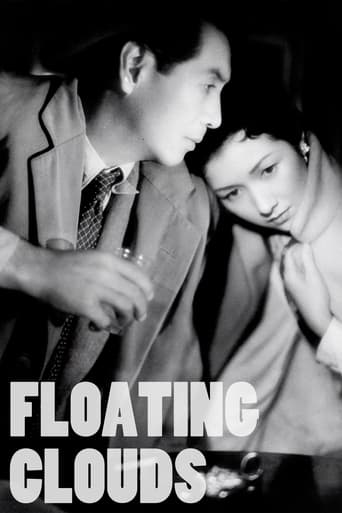jandesimpson
Ot the three senior directors who dominated the golden age of Japanese cinema, Mikio Naruse is the least known in the West. This could be partly due to the fact that unlike his contemporaries, Mizoguchi and Ozu, his cinematic language was more conventional and less innovative. And yet, if one looks long and hard, it becomes possible to identify stylistic trademarks that could be uniquely his, characters that are forever walking and interiors that are often shot from the centre of a room looking towards a corner. The very title is a metaphor for characters that are drifting their lives away with very little sense of purpose. The tragic couple, Yukiko and Kengo, who met in French Indo-China during the second world war when they were engaged on a forestry project find themselves drifting when they meet up again in a post-war Japan soured with defeat and despair. Generally when we see them they are walking, often through urban landscapes of a Tokyo desolate and scarred by the immediate past. They are always on the move in the manner almost of characters in a road movie to wherever they can travel, be it to a sad holiday resort out of season or a remote island drenched by rain that hardly ever stops. But their relationship is doomed partly because whatever passion they may feel for one another is always curiously out of sync with each other's. Their personalities are also deeply flawed to the extent that neither is able to cope with the social disadvantages of being part of a defeated nation. It has been said that defeat left many professional Japanese men feeling emotionally emasculated. This is certainly true of Kengo. As for Yukika, she has none of the stoicism of Mizoguchi's long suffering female protagonists. Dissatisfaction with her lot has left her whingeing with self pity. ""Floating Clouds" is a deeply pessimistic film in a way that Kurosawa's "The Silent Duel", which deals with a pair of lovers living through the similar period of the immediate aftermath of war, is not. Ultimately Kurosawa's characters come to terms with misfortune in a way that presages a future of some hope. Both films no doubt reflect their directors' widely different temperaments.
DICK STEEL
If you're looking for a movie that deals with clingy relationships, then Floating Clouds is without a doubt a movie that fits the bill to a T. Directed by Naruse Mikio and based upon the novel by Fumiko Hayashi, the female character in the movie will bring back memories of those who have had to deal with such stifling clinging, and well, for those who do act as such, a stark and accurate portrayal that would be akin to holding up a mirror and looking at oneself.Hideko Takamine put up a commendable, if not personally what I deem as a remarkably irritating performance as Yukiko Koda, a woman perhaps with little self-esteem and respect, who decided to sacrifice an entire forest for one singular tree. Being sent to Indochina during WWII, she chances upon Kengo Tomioka (Masayuki Mori), and while he seemed to be prim and proper, and not giving her a second glance, soon they fall in love with each other, one despite having a wife back home, and the other, knowingly being the other woman.But when the war ends and they get repatriated back to Japan, she looks him up, only to discover that he will not leave his wife, nor to rekindle their passion started in a foreign land. To make things worse, she discovers he's quite the cad, and to compound the problem, her insecurities and her paranoia makes you wonder why she can't afford to sever ties. It's one thing being made to suffer from unrequited love, but it's another if you are made to suffer deliberately, and bear witness to the insincerity of the other party. Running slightly over 2 hours, it does take its time to showcase the sorry state that Yukiko undergoes.You can't really find fault with Naruse Mikio's direction of the movie - the handling of the narrative structure in the first act was deft, with the transition of time seamless, and the actors do their job to allow you to connect with their characters. However, like I mentioned, perhaps Yukiko Koda did such a fine job, that for me I found her to be a tad too irritating, even for my liking.
Michael Kerpan (kerpan)
"Ukigumo" covers a considerable span of time and numerous locations. It tells the story of a young woman (Hideko Takamine) who served in Japan's forest service in Indochina during WW2, and fell in love with a (married) co-worker (Masayuki Mori) while there. After the war, she returns to Japan, completely impoverished, and finds her lover (more or less) comfortably re-established in his family and uninterested in fulfilling the idle promises he made during the war. While Mori is only willing to dally half-heartedly with her (as well as younger prettier women), Takamine remains obsessed with him. Takamine and Mori do a fine job. I found the story effective enough, albeit a bit overly melodramatic. Not my favorite Naruse film, but very much worth seeing.
rufasff
This melodrama of postwar Japan seemed to resonate with the people I watched it with; many seem to have seen it when it came out and it really spoke to them; but alas it is really a turgid melodrama that can't sustain your interest. Well directed and acted; it none the less becomes a series of redundant bad break scenes for it's heroine. Worth seeing, but not one of the greats of Japanese film.



